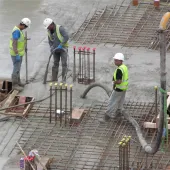UK construction reacts to 2023 autumn statement
Reaction to UK Chancellor of the Exchequer Jeremy Hunt’s 2023 autumn statement among the UK’s construction sector has been broadly positive.
Industry leaders have particularly welcomed the extension of full expensing (a 100% first-year allowance for main rate expenditure) and the allocation of £110 million to help local authorities offset nutrient pollution.
Hunt also announced additional funding to tackle planning backlogs in Local Planning Authorities (LPA), alongside a consultation on further reforms to streamline the planning system and a new permitted development right to enable one house to be converted into two homes.
Hunt also announced an extension of the £3 billion affordable homes guarantee scheme, which offers government-guaranteed low-cost loans to housing associations (HA) to build homes, or improve their existing stock, by a further £3 billion.
There was also £32 million to tackle the UK’s planning backlogs, alongside a new permitted development right to allow one house to be converted into two homes.
Mineral Products Association (MPA) chief executive Jon Prichard said: “Overall it is a good autumn statement that focuses on several of the key issues for MPA members. Making full expensing permanent will be widely welcomed, especially in capital-intensive industries such as ours that rely on investment in land and equipment to deliver our product.
“The chancellor’s announcement on accelerating planning for major applications has a lot of potential but we look forward to seeing the detail to fully understand the benefits it may bring. It’s vital the mineral products industry can secure planning permissions at a reasonable pace and fair value for money. Local authority planning teams have long been over-stretched and we welcome incentives to invest in more capacity to support more effective delivery.
“We were disappointed not to have an announcement on a carbon border adjustment mechanism and note in the documents that we should be hearing more soon. This is essential to ensure a level playing field for UK cement producers ahead of the EU CBAM starting to charge from 2026. We note the increases in the aggregates levy in 2024 and 2025. MPA has always challenged the environmental case for this tax which does not recognise the positive contribution made by the sector in areas like biodiversity gain and responsible site management.”
Construction Products Association (CPA) economics director Noble Francis said: "With one eye on the general election next year, this was always likely to be an autumn statement primarily aimed at helping working households and businesses. Jeremy Hunt highlighted that lower personal and business taxation will play a central role in the Conservative party’s approach for next year’s election and gave more clarity to the government’s updated approach to boosting growth. A cut in the National Insurance rate from 12% to 10% and ‘full expensing’ for business investment were the two key headlines from the chancellor’s speech.
"For UK construction product manufacturers, it is the ‘full expensing’ announcement that will resonate most with them. CPA was a key part of the letter calling for this measure to be made permanent and is pleased to see this confirmed today. This will allow companies to invest in the UK to reduce their tax by up to 25p for every £1 they spend on plant and machinery.”
“It is disappointing, however, that government hasn’t published an updated national infrastructure and government construction pipeline since September 2021 and announced in the autumn statement that there also won’t be a revised national infrastructure strategy until next year. This lack of certainty over the project pipeline means that it is difficult for all firms in the construction supply chain to justify signing-off significant new investments in skills and capacity, especially after all the government announcements of infrastructure projects being paused, delayed and cancelled this year.
"This autumn statement marks a step in the right direction from government for the construction industry, but how much of it is electioneering as opposed to real action is not yet clear."
Richard Beresford, chief executive of the National Federation of Builders, said: “It has been some time that a chancellor played prime minister by linking the importance of regulatory reforms with growth, and it is hugely welcomed. For decades, business has felt increasingly dictated to, rather than enabled and we hope this is a sign of much needed direction change where business is enabled to innovate and invest, rather than placated with tax cuts.
“The announcements to cut to self-employment taxes, increase investment in housing, regulatory reforms on the grid and permitted development, funding for nutrient neutrality and an acknowledgement that commercial premises should not be stifled by planning permissions all showed that the government is taking the environment for growth seriously.
“Additionally, investments in electric vehicle charging infrastructure, the expansion of technical skills, an increase in minimum living wages, the permanency of full expensing, and back-to-work plans also make for an interesting mix of strategies that will please many.
“Even housebuilders were given a glimmer of hope, signalling that the Government is taking their challenges seriously.”
Construction Equipment Association chief executive Suneeta Johal said: “This statement marks a positive development, especially for the manufacturing sector, which values the emphasis on resolving enduring economic issues. The decision to make full expensing permanent provides the clarity and stability businesses require for their investment decisions.
“Additionally, the new initiatives to improve engineering apprenticeships and advance manufacturing signify a proactive effort to develop high-value growth and skilled employment, shaping a robust future economy.
“The chancellor’s commitment to making the full expensing policy a permanent fixture is a landmark achievement. The ability for companies to claim 100% capital allowances on qualifying plant and machinery investments, and write off the cost of investment in one go is not just a financial boon; it's a catalyst for accelerated growth and modernization.
“This significant policy change, a result of concerted efforts by Make UK, CBI and the Construction Equipment Association alongside over 200 organisations, stands as an example of the powerful outcomes that can be achieved through collaborative industry-government engagement.
“However, the absence of discussion on fuel duty is particularly disappointing. In an industry where fuel costs substantially impact operations, this oversight is a missed opportunity."
Builders Merchants Federation chief executive John Newcomb said: “The announcement on full expensing will be welcomed by builders merchants and building material manufacturers along with many other businesses as they invest to expand and upgrade their facilities. But, beyond a pledge to reform elements of the planning system, there was little direct support for the construction sector in the main headlines of the autumn statement.
“We want to get Britain building again, but there was nothing in the budget relating to our number one ask, support for a national retrofit strategy. This was a missed opportunity to stimulate the repair maintenance and improvement sector, create thousands of appropriately skilled jobs and boost much-needed local growth, while at the same time helping millions of families to improve their homes’ energy efficiency and cut heating bills.
“We will continue to speak directly to government to promote the positive impact of a skilled RMI programme. Our parliamentary reception next week will focus on the work we are doing to build a workforce to deliver the low carbon solutions that are the essence of the national retrofit strategy and the impact kickstart support from government would make.”
Federation of Master Builders chief executive Brian Berry said: “The autumn statement will be welcomed by small builders, with the government finally taking steps to support micro and SME businesses in a sector which has faced significant difficulty in recent years. However, this must only be the start if the government is serious about tackling the challenges we continue to face. Measures to reform the way local authorities process planning applications is good news, as are plans to help fund local authorities tackle nutrient neutrality mitigation. However, substantial increases in funding for local authority planning departments are needed if we are to see real progress.
“There were some surprising outcomes, like the changes to permitted development rights, which will bring work for house builders and the repair, maintenance, and improvement sector. Buried in the details is additional support for housing associations to deliver energy efficiency improvements. This support should also be rolled out to the owner-occupier sector to help improve the UK’s leaky housing stock.
“Financial support for SMEs represents another positive step, along with other announcements to boost SME growth, such as adopting digital technology. It is good to see that skills training has received a boost, with additional funding announced to increase the number of apprenticeships undertaken.”







